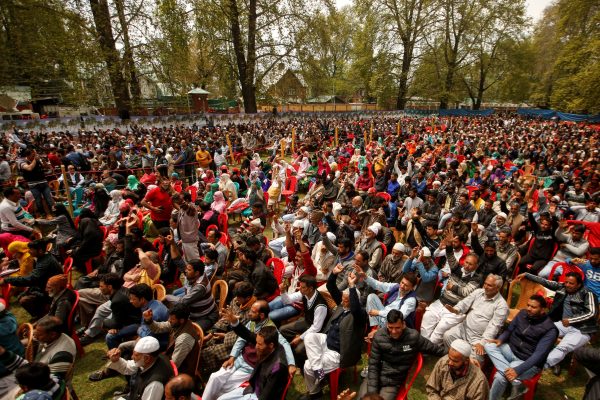But the recent Pulwama–Balakot crisis was characterised as much by a disinformation spectacle as military operations.
On 14 February 2019, in Pulwama in India-administered Kashmir, a local Adil Ahmad Dar rammed a truck laden with explosives into a convoy — killing 40 soldiers belonging to the Indian Central Reserve Police Force. India promised revenge and blamed Pakistan, citing a purported claim to responsibility by the Pakistan-based militant group, Jaish-e-Mohammad. On 26 February, the Indian Air Force crossed the Line of Control and carried out a ‘non-military pre-emptive action’, claiming to have killed several hundred terrorists near Balakot inside Pakistan.
Pakistan in turn dismissed India’s claim and displayed the targeted area, indicating that only a few trees were damaged in a forested area. The next day, the Pakistan Air Force (PAF) retaliated by targeting four areas in India-administered Kashmir, saying it had avoided targeting military sites and civilians. In the ensuing dogfight, the PAF claimed it shot down two of India’s MIG-21 jets and captured one of the pilots. India claimed to have shot down a Pakistani F-16, although has not offered convincing evidence to support this claim.
Pakistan returned the pilot to India two days later as a gesture of de-escalation and peace, and both governments made use of the pilot’s repatriation as an off-ramp from the crisis.
The crisis did dissipate but not before melodramatic nationalistic fervour gripped both nations. The Pulwama–Balakot crisis captures the symbiotic nature of politics and war. Ashley Tellis, a respected US scholar, observed that, ‘The Pulwama attack arguably provided a golden opportunity for [Prime Minister] Modi to transform an election — that until that point was fought mostly on economic and political issues — into a plebiscite on national security issues where his nationalist credentials would advantage him over his opponents’.
Modi’s strategy to apply military instruments to upturn his political fortunes in a closely contested election clearly ended in an embarrassing misadventure. Yet it is too early to call his strategy a complete failure. Electoral forecasts do not indicate any negative fallout among his fervent Hindu nationalist supporters. Victory or defeat in the Pulwama–Balakot crisis is not contingent on the battlefield setbacks of February but on the election results announced in May.
Though all wars are accompanied by some degree of deceit and deception, the latest crisis in Kashmir was characterised less by the military standoff than a disinformation spectacle. For now, escalating tension between two nuclear-armed countries may have been averted, but the effects of using disinformation will take a long time to detoxify. Happymon Jacob at Jawaharlal Nehru University explains, ‘ States co-opt citizens into war-making frenzy’ and ‘cage them into nationalist narratives … while statesmen move on to other pursuits, the general population become a prisoner of its prejudices’. Herein lies the root of the Kashmir problem.
India’s conflation of the Kashmir separatist movement with the scourge of terrorism has confounded the India–Pakistan conflict into two competing narratives. India insists that Kashmir is a manifestation of Pakistan-sponsored terrorism aimed at avenging the 1971 war defeat, mitigating the conventional force imbalance and stymying India’s rise as a global power. India also firmly believes that Pakistan applies nuclear deterrence to coerce India into compromising on Kashmir.
Meanwhile, Pakistan is equally resolved that Kashmir represents an indigenous struggle for freedom compounded by brutal suppression. In this view, India has waged a ‘fifth-generation’ war to destabilise Pakistan using proxies from Afghanistan. Pakistan staunchly believes India’s strategic goal is to browbeat Pakistan into submission and establish India’s hegemony over a ‘West Bangladesh’. Pakistan is also convinced that nuclear deterrence has dissuaded India from wars and coercion, while stymying India’s hegemonic designs.
Nothing irritates India more than Pakistan’s persistence in seeking sovereign parity, which blunts India’s status as a major power. For New Delhi, any Kashmir-borne crisis evokes the possibility of re-hyphenating India–Pakistan and drawing the focus to India’s military high-handedness. Meanwhile for Islamabad, any terror-laden crisis evokes immediate dread that the source will be traced back to Pakistan, affecting in turn the Kashmir struggle and the country’s perilous economic and financial predicaments. For the international community, crisis between the two nuclear neighbours conjures up the spectre of an escalating conventional war leading to an accidental nuclear war.
As the crises dissipate and the region returns to normality, the world sighs in relief but leaves the two protagonists to sort out their matters bilaterally. With growing arsenals and innovative military doctrines, deterrence stability is far from assured. Future crisis sprouting from ‘hate narratives’ could demand lethal kinetic actions. There is sufficient reason to remain alarmed about the unrelenting conflict between two nuclear-armed countries.
Unless India stops repression in Kashmir and Pakistan decisively eliminates militant organisations on its soil, the region will remain on the brink of a miscalculated war. It is time the international community shuns ignoring both sources of instability in this volatile region.
Feroz Hassan Khan is a Research Professor at the Naval Postgraduate School, the Department of National Security Affairs.

